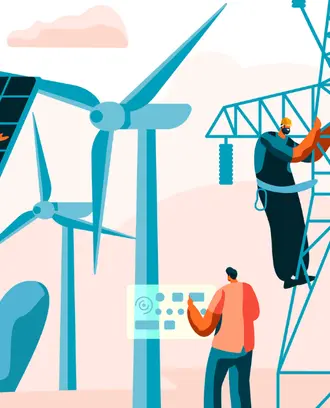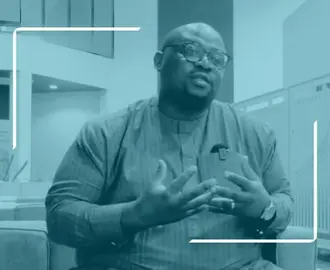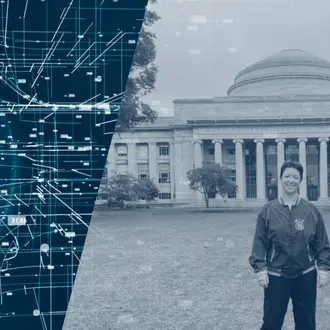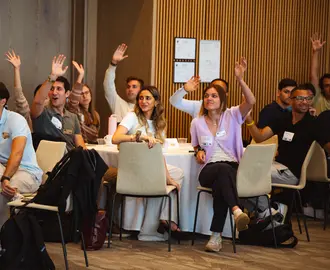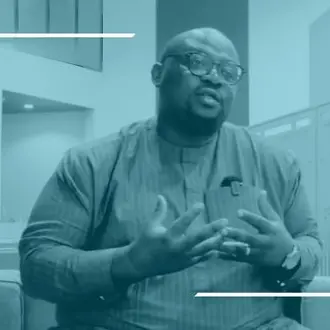The Sustainability Initiative team has returned from New York Climate Week with a reenergized belief in our global society's ability to impact climate – for the better. The energy and momentum for climate action during the week's events was striking. Our team represented just four of the estimated 100,000 attendees, each of us eager to broaden our network and deepen our connections in the climate space.
Jennifer Graham presenting at "ClimateCAP on Tap"
Each member of our team went into climate week with a different focus – our Sr. Associate Director Jennifer Graham and Sr. Program Assistant Sophia Governo exploring the green job market that our students and alumni face; Director Jason Jay focused on sustainable finance; and Communications Coordinator Emma Kantola taking a deep dive into climate storytelling – all of us united by a shared motivation to find new ways to empower and equip our community to take climate action.
Still, we don’t ignore the challenges we collectively face. For our students, the job market is shifting. For practitioners, outdated investment strategies aren’t enough to spark the transformative change needed for our environment. For our sustainability ecosystem of students, alumni, and collaborators, climate anxiety interferes with progress. Even so, we are unapologetically optimistic about climate. Here’s why:
The demand for “green skills” in recruitment continues to rise
Despite uncertainty in the broader job market, recruitment for climate and sustainability roles remains strong, as highlighted in The Business Case for Green Jobs panel by the Environmental Defense Fund and LinkedIn. Graham and Governo demystify the job market for our sustainability students with advice gleaned from climate week:
- “Stack experiences” during business school. "The most successful students are those who look beyond the classroom to pursue experiential projects, competitions, conference leadership, and the networking that comes from putting themselves in the middle of the action," says Graham.
- Be adaptable. Students need to stay relevant and adapt to the ever-evolving landscape of climate work, explains Governo. For instance, having a baseline literacy in AI is quickly becoming an expectation in interviews and job functions. Likewise, students in this space should stay aware of “the dramatic - but not always permanent - shifts in corporate ESG commitments. Those who continue forward steadily, even if more quietly, often make the most lasting progress,” advises Graham.
- Build connections. Being part of a likeminded community of passionate and dedicated leaders is invaluable. We saw this in action at the sustainability alumni event we hosted during climate week. Governo noted that despite the variety of experiences and backgrounds, there was a shared “purpose, perseverance, and reinvigorated desire to create impact,” among the alumni present at the event.
The systems turn in finance is accelerating
Jason Jay presenting at "Climate Finance for Market Transformation in Hard to Abate Sectors"
One of our team’s focus areas is sustainable economics, finance, and accounting – using capital to create positive change in the world. We aren’t alone. Finance was one of 10 key themes at climate week, and practitioners from across the world joined to discuss financial opportunities to mitigate climate risks.
“The potential of our community to drive climate finance innovation is palpable, and was on full display at the event that the Sustainability Initiative hosted with S3 Markets and Quantum Alliance” says Jay. This session, Climate Finance for Market Transformation in Hard to Abate Sectors, brought together a variety of experts playing a role in subsidizing green commodities and transforming markets. Learnings from this session and other climate week events include:
- We need high quality climate finance. In Jay’s presentation, he shared the 5 C’s of High-quality Climate Finance: “Coordinating Catalytic Capital and Customers, Confident in the data and models pointing the way to market transformation.”
- We have to break the silos of institutions, sectors, and asset classes to go from projects to systems change, says Francine Pickup from the United Nations Development Programme (UNDP). Climate change is complex. To solve it, we have to move away from single point solutions, and instead focus on “creating synergistic webs and portfolios” that can create outsized positive impact, explains Jay.
- We need action. “Transformation cannot be achieved by consensus,” as Tatiana Fernández Sirera from the Government of Catalonia puts it. “Instead what’s needed is a coalition of people who understand and live with the problem, and design innovation pathways that governments can support and investors can join,” adds Jay.
A key aspiration for our Owning Impact Project is to apply all these ideas to the domains where MIT can most powerfully impact the climate.
It’s okay to be hopeful about climate action
The Sustainability Initiative team at the "MIT Innovation Showcase." From left: Emma Kantola, Sophia Governo, Jennifer Graham, Jason Jay.
Experts are, including many from our MIT community. The MIT Innovation Showcase hosted by the MIT Climate Project brought together founders, investors, and alumni committed to climate solutions, and the excitement and energy in the room was infectious.
”This gathering reminded me of the unique role MIT plays in bridging innovation with practice - both through our ecosystem of startups and through the networks of students and alumni who bring these ideas into the world. It was a powerful reminder that our community is not just participating in the climate conversation but helping to lead it,” shares Graham.
The Sustainability Initiative team left Climate Week not only hopeful about this work, but with a staunch belief in our ability to make an impact – so humans and nature can thrive for generations to come.
Our People, Our Impact
